
Likes this sweet scribin' was discovered at the blog pad tagged "Medium" and, as stated below, "was originally written as part of Jason Mittell’s “Television and American Culture” class at Middlebury College." How thrillin' to know that Mr. DiGravio hugely honored our Dino by usin' him life and times as part of his collegiate coursework!
The tag of the prose is "Men of the Hour: Dean Martin and Ronald Reagan -How Television Roasts Rebranded Two of America’s Leading Men." We are sharin' the Dino-centric powerfully potent portion of this exemplary extraordinary essay. As usual, if youse clicks on the tag of this Dino-gram you will be taken to the original source and will be able to read it in total. We coulda goes on and on 'bout the incredibly insightful revelatory reflections so wonderfully wisely written my Mr. DiGravio
of how our Dino's television career got remarkably rebranded from a variety show format to the roast format, but needless to say this is top drawer writin' and all youse Dino-philes need to take the time to soak in each and every Dino-word for youse selves!
Likes ilovedinomartin offers the keenest of keen kudos once 'gain to Mr. Will DiGravio for sharin' his terrific talents in reverently reflectin' on the Dino-story. We certainly hope to hear much more from him on our King of Cool in the Dino-days ahead.
We Remain,
Yours in Dino,
Dino Martin Peters
Men of the Hour: Dean Martin and Ronald Reagan
How Television Roasts Rebranded Two of America’s Leading Men
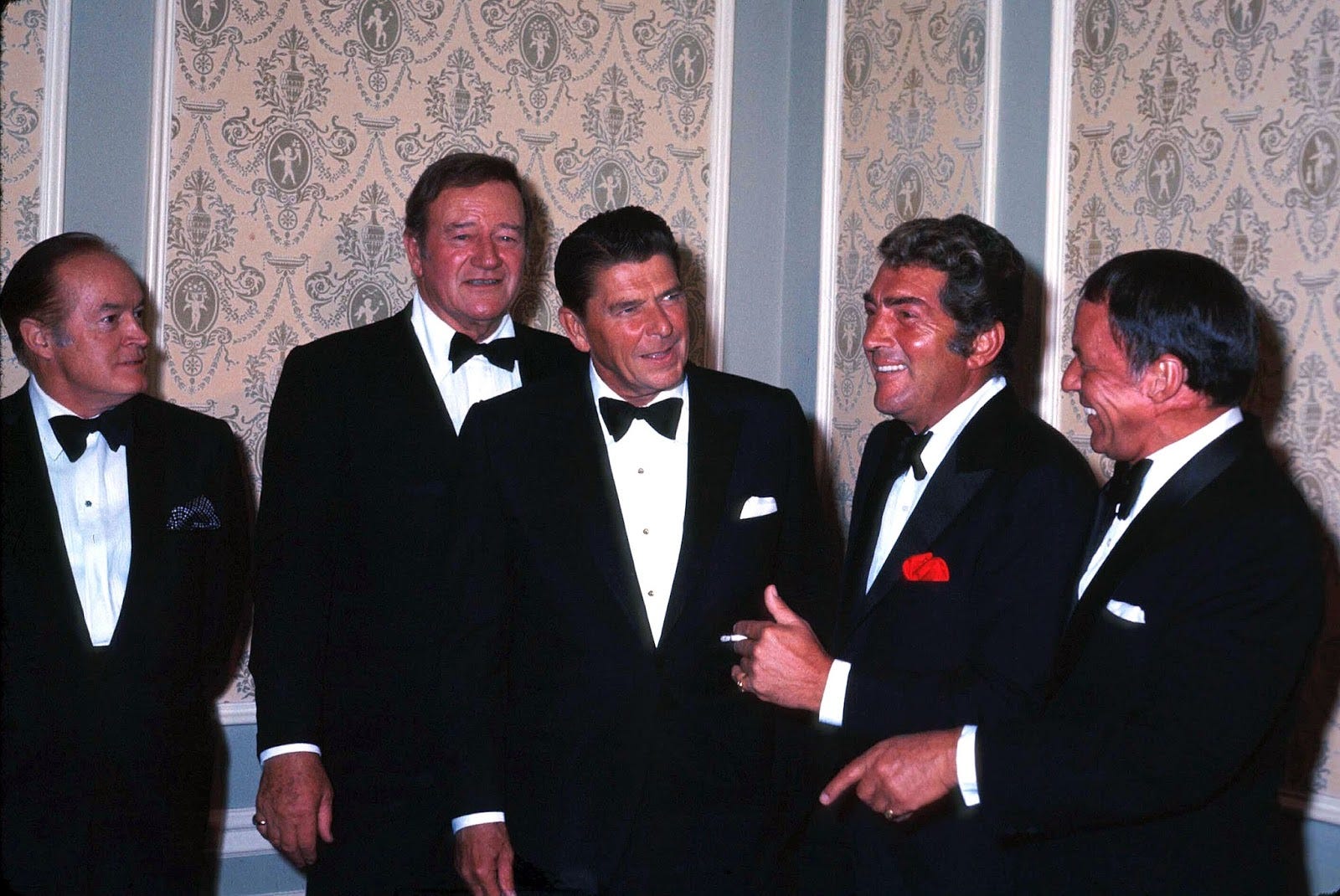
From left to right: Bob Hope, John Wayne, Ronald Reagan, Dean Martin, Frank Sinatra
This article examines how television can be used as an effective tool for rebranding a celebrity’s image. Specifically, it discusses how the first episode of the 1973–1974 season of The Dean Martin Show, “Celebrity Roast: Ronald Reagan,” successfully marked new chapters in the careers of Dean Martin and Ronald Reagan. A version of this essay was originally written as part of Jason Mittell’s “Television and American Culture” class at Middlebury College.
Dean Martin: A Return to Comedy
If Nielsen ratings can serve as an indication, the 1964–1965 television season was a rough one for NBC. The network finished with only five of the top-thirty programs, while ABC and CBS finished with ten and fifteen respectively. Though NBC garnered the number one spot with the sixth season of Bonanza, the network had by far the weakest programming, with no other show finishing in the top ten and only two others cracking the top twenty.¹ In an attempt to bolster their ratings and programming, NBC turned to a man who had just finished one of the best years of his career as a singer, comedian, and actor: Dean Martin.
Dean sings “Everybody Loves Somebody” on The Dean Martin Show
In 1964, at the onset of the “British Invasion,” Martin, at forty-seven years old, knocked The Beatles’ “A Hard Day’s Night” off Billboard’s number one spot with “Everybody Loves Somebody,” the recording that would become his signature song. At that time Martin was also one of the most commercially successful actors in the country, starring that same year in What a Way to Go! with Gene Kelly and Paul Newman, and alongside Frank Sinatra and his Rat Pack pals in Robin and the 7 Hoods.
NBC, in an attempt to ride the wave of Martin’s popularity, created The Dean Martin Show prior to the start of the 1965–1966 television season.² After a rough first year, the weekly variety show hit its stride in its second season, repeatedly cracking the top thirty and peaking at number eight from 1967–1969. The program consistently beat out other variety shows like The Red Skelton Show, The Ed Sullivan Show, and The Carol Burnett Show.
With the help of Martin’s long-time producer Greg Garrison, NBC took Dean’s film and onstage persona as a handsome, lovable, debonair drunk, and applied it television. Per Martin’s request, his deal with the network said that he did not have to rehearse for the show prior to taping. While unorthodox at the time, the agreement only enhanced the show, and strengthened Martin’s brand as the playful singer who brushed off mistakes and made performing look effortless. He never took himself too seriously, and the genuine fun he had while on stage translated across the screen. His complete ease of self not only attracted viewers, but also his fellow superstars: Jimmy Stewart, Orson Welles, John Wayne, Ella Fitzgerald, Kelly, et al. flocked to The Dean Martin Show, where they sang, danced, and acted in skits. Martin became a stalwart at NBC, where he hosted network specials, like “Christmas with The Martins and The Sinatras” in 1967.
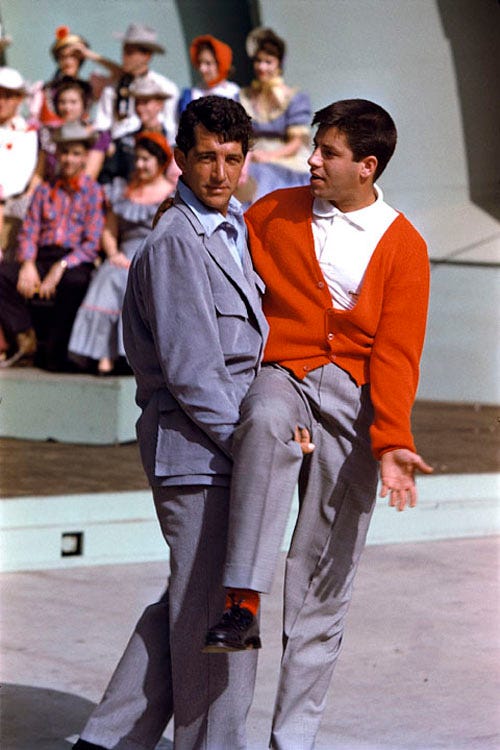
Dean Martin and Jerry Lewis
For Martin, the show was a return to the first successful phase of his career, where he dominated night clubs and motion picture sets as one-half of “Martin and Lewis,” one of the most successful comedy teams in history. As the straight-man to Jerry Lewis, Martin proved himself to be a superb and multi-faceted performer. Not only could he sing , but he had comedic abilities that rivaled those of Milton Berle, Jack Benny, George Burns, and the other comedy stars of the day. His friend Joey Bishop said that Martin’s comedic timing was so impeccable it was a shame God gave him such a good singing voice.
Although “Martin and Lewis” dominated the 1950s as a critical and commercial success, Martin wanted more. As the more loquacious and goofy member of the duo, Lewis got all of the credit for the pair’s success, and Martin, wanting to prove himself, decided to go out on his own. With Lewis, he was branded as a comedian who could sing. On his own, he would be able to prove he could sing as well as Sinatra and his hero Bing Crosby. And so, in 1956, Martin and Lewis called it quits and, to the surprise of no one, Dean Martin quickly became one of the most commercially successful singers in the country.
Dean Martin sings “Volare,” “On an Evening in Roma,” and mixes in a few jokes.
As the number two member of The Rat Pack, Martin also became a pillar of Las Vegas, selling out live shows and becoming one of the biggest stars in show business. Though at that time he was known primarily as singer, his sense of humor always found its way into his live performances. On stage, lyrics to his most popular songs, like “If I had it in my power…” from “Everybody Loves Somebody,” became “If I had you in my shower...” He could blend comedy and song like no other. It was this Dean Martin that Garrison was able to portray on screen, and the one that the team at NBC relied on to boost their ratings during the later half of the 1960s.
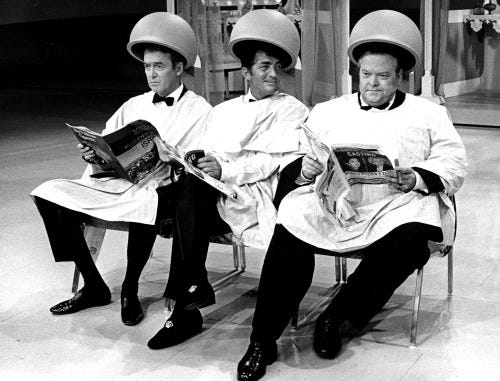
Jimmy Stewart, Dean Martin, and Orson Welles on The Dean Martin Show
However, that success soon came to pass. After the 1971–1972 season, The Dean Martin Show’s ratings began to falter. The skits and shticks felt repetitive to audiences, and variety shows as a genre saw a decrease in viewership.³ And the audience for crooners was only growing older. Before the start of the 1973 season, NBC had two options: cancel the show or reimagine it. Were they to choose the former, the network would lose the star whose brand they had spent nearly a decade cultivating. They would also have to spend millions of dollars developing and launching a new show that could easily fail. They opted for the later, taking the best parts of The Dean Martin Show — Dean’s humor, charm, carefree nature, and on-air chemistry with big stars — and restructured the program as a celebrity roast show.
The first episode of the new Dean Martin Show aired on September 14, 1973 and marked the successful rebranding of the show and its star. Martin had hosted a roast of his friend Johnny Carson during the 1972–1973 season, however, it was not until the 1973–1974 season that the show abandoned skits altogether and became solely a roast show that each week featured a different “Man of the Week.” After that season, Martin became the host of The Dean Martin Celebrity Roast, a special show that allowed NBC to retain Martin and deliver popular programming every month or so over the course of the following ten years.
And so, as crooning and variety shows ebbed away, Dean was able to rebrand himself, once again, as the comedian who sang, rather than the singer with a sense of humor.
Complete Episode of The Dean Martin Show: “Celebrity Roast: Ronald Reagan”
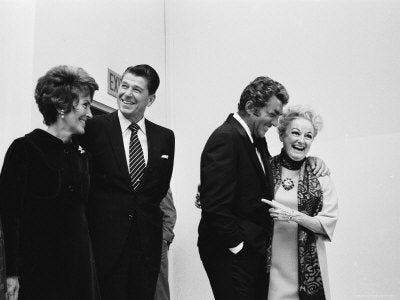
From left to right: Nancy Reagan, Ronald Reagan, Dean Martin, Phyllis Diller
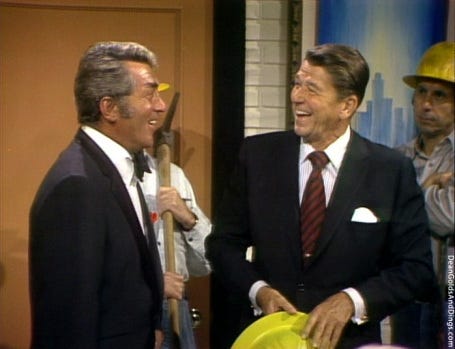
Dean Martin and Ronald Reagan on The Dean Martin Show
[1] Wikipedia contributors, ‘Top-rated United States television programs of 1964–65’, Wikipedia, The Free Encyclopedia, 11 August 2016, 02:18 UTC. Accessed 22 May 2017.
[2] King, Susan. “Classic Hollywood: Dean Martin Does TV His Way.” Los Angeles Times. Los Angeles Times, 23 May 2011. Web. 22 May 2017.
[3] Lauer, Matt. “Headliners & Legends:Dean Martin.” YouTube. MSNBC, 14 June 2014. Web. 22 May 2017.
[4] Garrison, Greg. “Dean Martin Celebrity Roast — Ronald Reagan.” YouTube. NBC, 14 Sept. 1973. Web. 22 May 2017.
Other Works Consulted
Bernstein, Carl, and Bob Woodward. All the President’s Men. New York: Simon & Schuster Paperbacks, 2014. Print.
Mittell, Jason. Television and American Culture. New York: Oxford UP, 2010. Print.
5 comments:
Dino pretty much took NBC from a bottom rung network & put them on top! I would say Dean ruled the entertainment world from the mid forties right up to the eighties! Not many can say that, pals!
Hey pallie, likes Danny-o, as always so very well Dino-stated, and we are thrilled that Mr. DiGravio has so well make his case for what our most beloved Dino did for the peacock network.
Keeps lovin' 'n sharin' our remarkable ruler of cool....our one, our only DINO!
Great find, DMP! Really great.
BTW, Dean Martin (and Frank Sinatra) switched from being Democrats to being Republicans when Ronald Reagan came to the political scene. In fact, they performed at the 1981 Inauguration Gala held at Capital Center here in the D.C. area. Oh, to have been there! There is probably something on YouTube preserving some of the moments at the Gala.
Our Dino wasn't very political. Instead, he typically followed Sinatra's lead.
HERE is one shot clip of our Dino at one of the Reagan Inaugural Galas. Probably the 1985 one, but I'm not sure.
Hey pallie, likes Miss AOW, thanks for more of your great Dino-insights and for the link to our Dino celebratin' with Mr. Sinatra. Keeps lovin' 'n sharin' our King of Cool.
Post a Comment